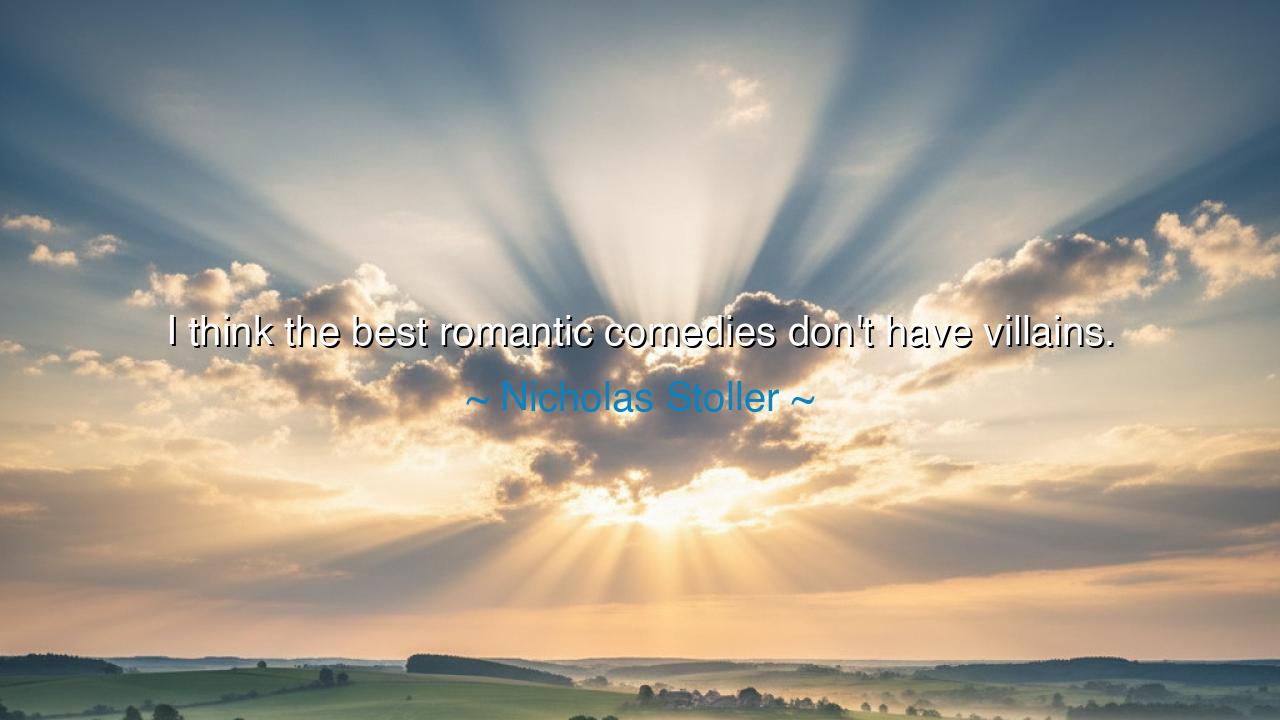
I think the best romantic comedies don't have villains.






In the thoughtful words of Nicholas Stoller, "I think the best romantic comedies don't have villains," we encounter an exploration of the most essential truth behind romantic comedy—that the heart of love is not in the battle against evil or adversity, but in the human connections that bring joy, healing, and growth. Stoller’s insight challenges a fundamental convention of storytelling: the idea that a story must have a villain to create conflict. In the realm of the romantic comedy, the true conflict lies not in defeating a malevolent force but in navigating the complexities of love and self-understanding. The most beloved romantic comedies, Stoller suggests, focus on the relationships, not the antagonists.
The ancients understood this concept well, especially in their comedies. Take, for instance, the works of Aristophanes, whose plays like Lysistrata and The Clouds present conflicts that are not defined by the struggle between good and evil, but by the human flaws, desires, and misunderstandings that arise in society. In Lysistrata, the protagonist and her fellow women do not battle a villain but rather face the absurdity of war and the tensions between men and women. Aristophanes captured the comedy of human nature, showing that the true conflict is often internal or societal, not a battle between clearly defined heroes and villains. Similarly, the romantic comedy has its roots in this tradition—love is not about fighting a single evil force, but about overcoming the small, everyday conflicts that prevent two people from connecting.
In Shakespeare's romantic comedies, too, we find a rejection of the need for a villain. In Much Ado About Nothing, the central tension arises from misunderstandings and social expectations rather than a villainous antagonist. The play revolves around the romantic entanglements of its characters, where their own insecurities, pride, and miscommunication create the primary conflicts. Even the character of Don John, often regarded as the villain, is a mere catalyst for misunderstanding rather than an embodiment of evil. Shakespeare’s genius lies in his ability to create drama without relying on villains—focusing instead on the inner conflicts of his characters, their journey toward love, and their eventual growth. In this way, Stoller’s idea that the best romantic comedies lack villains echoes a long-standing tradition in storytelling.
In modern romantic comedies, this lack of a villain often results in a more realistic, human portrayal of love. Take When Harry Met Sally, where the central conflict lies not in the intervention of an external antagonist, but in the personal growth of the characters. Their journey toward love is complicated by their own fears, insecurities, and the passage of time. The real challenge is not in defeating a villain, but in overcoming the barriers they’ve built around their own hearts. Similarly, in Notting Hill, the tension is rooted in the difference between the lives of an ordinary man and a famous woman. The movie does not hinge on any villainous force, but instead focuses on their struggle to reconcile their differences and find common ground. In this way, Stoller’s idea of a romantic comedy without villains speaks to the power of human relationships to create both the conflict and the resolution.
The absence of a villain in the romantic comedy allows for a more nuanced exploration of love. In these films, the primary antagonist is often the characters’ own fears and misunderstandings—their inability to communicate or trust. It is within these personal struggles that the deepest transformations occur. A romantic comedy’s charm lies not in the victory over evil, but in the growth of its characters. It is in the overcoming of internal struggles—fear of commitment, past trauma, or the complexities of balancing love with other aspects of life—that the true beauty of the story unfolds. As the ancients recognized, the battle is not always external but lies within the hearts of the characters.
Stoller’s statement reveals a fundamental truth about human nature: the best stories are those that reflect the complexity of human relationships, showing how love requires effort, understanding, and vulnerability. The best romantic comedies remind us that the most significant obstacles we face are often not villains, but the internal and societal forces that shape our perceptions of love and ourselves. Just as the ancient heroes faced their own flaws and growth, so too do the characters in romantic comedies confront their own fears and limitations. These struggles create the true drama and beauty of the story.
The lesson Stoller imparts is one of human connection and personal growth. In your own life, recognize that love is not about fighting external forces, but about understanding and confronting your own fears, insecurities, and limitations. Just as the characters in romantic comedies grow through their relationships, so too can you learn from the struggles within your own connections. Embrace the complexities of love, knowing that the true conflict lies in the journey to become whole, to trust, and to communicate authentically. Let go of the idea of villains, and instead focus on the transformative power of overcoming the internal barriers that prevent true connection. Through this, you will find that love, though difficult, is the most rewarding journey of all.






AAdministratorAdministrator
Welcome, honored guests. Please leave a comment, we will respond soon